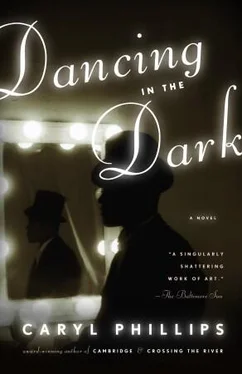A fatigued-looking Bob Cole passes George the bottle. He waits for him to take another drink before he says anything further. George pours a full glass and then he throws it back in one movement, head, neck, glass, whiskey, all moving as one. George breathes a long sigh of relief and then pours a second glass and passes the bottle back to Cole, who laughs.
“Long night?”
George laughs. “ A Lucky Coon ain’t so lucky for this coon.”
Cole pours himself a drink. “Everything all right with Bert?”
“Why you asking?”
“Well you know, since he got married, he’s been acting kind of different.”
George sits upright and looks at Cole. “Ain’t no way to talk about Bert.”
Cole opens his broad mouth, ready to insist that he isn’t talking about Bert no way, but George holds up his hand.
“Bert got pressures on him that you and me don’t fully understand.”
Cole laughs sarcastically, but he will not meet George’s blazing eyes.
“I said he got pressures on him that maybe we don’t understand, and if you can’t be respecting this, then maybe it’s best you hold your tongue.”
Cole is stung now. He has no desire to argue, yet here he is fighting with old George. He takes a drink, and then he turns and addresses his fellow performer with melancholy coursing through his voice.
“I’m just worried, George. Bert ain’t never been one to mix in, you know that better than anybody, but this marriage thing seems to have beaten up on old Bert.”
George says nothing. He takes a sip of his whiskey and he continues to look closely at Cole, whose face is as easy to read as that of a clock.
Later.
“George, you have to treat women like you’re a dead-swell coon who’s always got somebody that you’re ready to replace them with. You let a woman know that you’re feeling too much for her, then it’s over for you as a man. You may as well take up with one of those goddamn inverts that you see all over our business. You listening to me, George?”
There were no colored girls in any of the venues they played on the Barbary Coast, and so after their performances George would rush down to the seaport, and the colored taverns, where he knew that a sporting welcome always awaited “Mr. George.” “Ladies, if it ain’t Mr. George paying us a visit this evening.” “Sit yourself down here, Mr. George, you sweet thing you.” George was barely out of his teens, but hustling was in his blood and the powdered and overscented dusky belles of the San Francisco seaport recognized one of their own kind. To begin with Bert would accompany him, but while George hurried upstairs in search of company his cautious colleague would stay downstairs by the bar, listening to the piano playing and concentrating on the drink in front of him. When George came back down he inevitably found his friend still there. Sometimes, the barman aside, Bert was the only patron left in the place, and although George was puzzled by Bert’s reluctance he already knew that this was a subject that it was best not to raise with him. And then George began to leave the Midway Plaisance without waiting for his partner, who he sensed was deliberately taking his time in an effort to avoid the seaport. And sure enough some tension between the two of them began to dissipate, for there was no longer any expectation, and some nights Bert even found his way to the seaport by himself. Stumbling downstairs, his shirttail flapping outside his pants, George was always happy to see Bert sitting at the bar and grinning in his direction. And then one night, having taken a good fill of liquor, George forgot himself and asked Bert the question.
“What’s the matter, Bert, you don’t like catting for women, or you don’t like colored girls, which is it?”
Bert looked at him in fake surprise and arched his eyebrows.
“Ain’t no other type of girl that I know of.”
“Well I know some of these colored girls are sweet on you. And they got moist thick lips like they be putting soft rubber all over your body.”
Bert laughed. “I already caught enough hell in my life and I ain’t got no interest in catching nothing else.”
“You ain’t never heard of protection? It’s true that some of those female diseases gets ideas and likes to ease their way into a man’s body so we all got to be careful.”
Bert smiled and shook his head, and then he took another mouthful of his whiskey. “First time I ever went with a girl I guess I wasn’t careful.”
George tucked his shirt into his pants then leaned back and began to roar with laughter.
“Man, bad luck sure knows where to find you. The first time?”
His friend nodded and took another gulp of his whiskey. Then he turned and looked George full in the face.
“These womenfolks are a strange breed. But I guess you already got that figured out.”
George was halfway out the window when the man finally broke down the door and burst into the bedroom. George had one foot on the complex iron labyrinth of the fire escape and one foot marooned in the bedroom when, for some reason, he looked again at the man’s wife, who pulled the sheet up to her neck with melodramatic haste. For a moment it occurred to George that his blond conquest might actually be enjoying this drama, and then she screamed and George saw that the irate man had whipped out a pistol from some part of his person and he was pointing it directly at him. He heard the noise of the pistol before he felt the hot pain in his arm, and again the man’s wife screamed. George discovered himself on the sidewalk running, and although the husband didn’t fire again he knew that the humiliated man was standing above him and watching. It was only when he reached their lodgings, and began to pound vigorously on the door to Bert’s room, that George realized that he was light-headed and he was unable to prevent himself from slumping heavily to the ground. He peeled back his jacket and saw that his shirt was covered in blood, but he already understood that there would be no time to call for a doctor. His partner opened the door and peered down at a prostrate George who was trying to smile, but the pain was clearly cutting him like a knife.
“We got to leave Cleveland tonight, Bert.”
Bert helped his friend to his unsteady feet and into the room, and he pushed the door shut behind him.
“What happened, George? We got to find you a good colored doctor. Looks like you already lost a lot of blood.”
George collapsed onto a chair and shook his head. “Gonna lose a whole heap more if we don’t get the hell out of Cleveland.” Bert handed his friend a damp cloth with which to stanch the wound.
“We have to find you a colored doctor on the way out of town. You hear me?” George nodded, his face now knotted in pain. “That white woman’s husband catch up with you?”
George looked up at his partner, but Bert already knew the answer to the question.
Detroit, 1896: And the first time he looked at himself in the mirror he thought of the embarrassment and distress that this would cause his father and his heart sank. Down through his body like a stone, down toward those long, oversized boots that announced him as a clown. How could a West Indian do such a thing to himself? The first time he looked in the mirror he was ashamed, but he understood that his job was to make people laugh so they did not have time to ridicule or hurt him. And so he made the people of Detroit laugh. No longer Egbert Austin Williams. He kept telling himself, I am no longer Egbert Austin Williams. As I apply the burnt cork to my face, as I smear the black into my already sable skin, as I put on my lips, I am leaving behind Egbert Austin Williams. However, I can, at any time, reclaim this man with soap and water and the rugged application of a coarse towel. I can reclaim him, but only later, after the laughter. As he looked at himself in the mirror he knew that he had disappeared, and he understood that every night he would have to rediscover himself before he left the theater. The first time he looked at himself in the mirror the predicament was clear, but just who was this new man and what was his name? Was this actually a man, with his soon-to-be-shuffling feet, and his slurred half speech, and his childish gestures, and his infantile reactions? Who was this fellow? Sambo? Coon? Nigger? However, the audience never failed to recognize this creature. That’s him! That’s the nigger! He looks like that. And that’s just how he talks. And he walks just like that. I know him! I know him! But this was not Egbert Austin Williams. This was not George Walker. This was not William E. B. DuBois. This was not Booker T. Washington. This was not any Negro known to any man. This was not a Negro. And the first time he looked in the mirror his heart sank like a stone for he knew that this was not a man that he recognized. This was somebody else’s fantasy, and unless he could make this nobody into somebody, then he knew that eventually his eardrums would burst with the pain of the audience’s laughter. The first time he looked at himself in the mirror his heart sank. In Detroit in 1896.
Читать дальше












